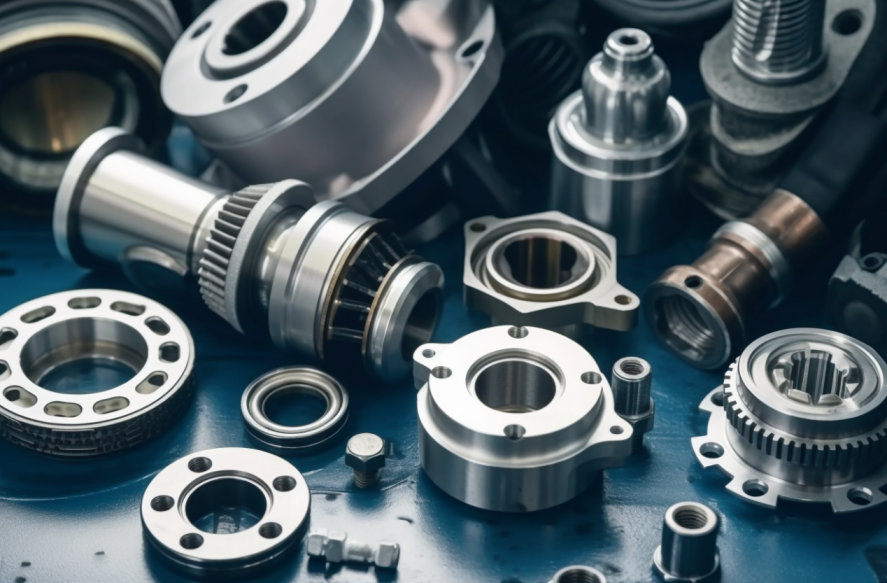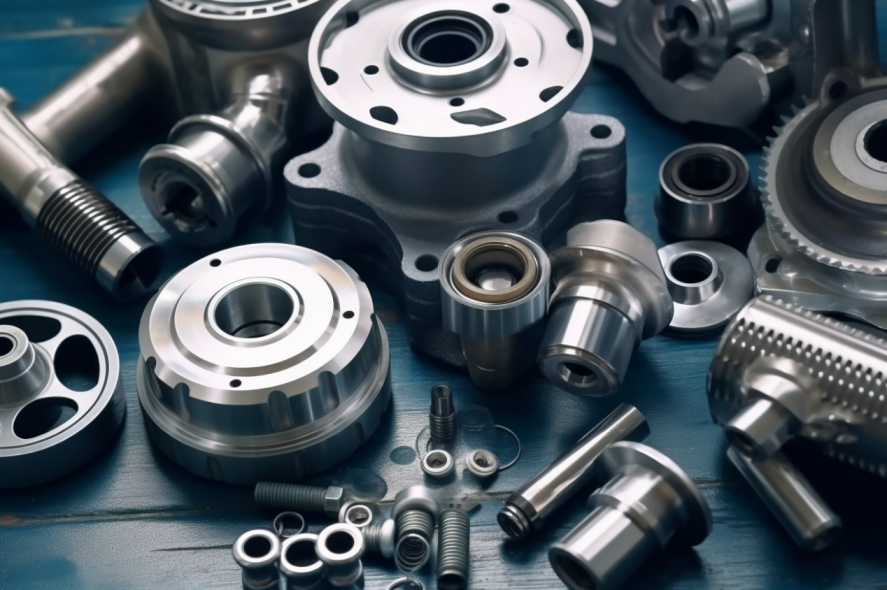Blog
We regularly update articles related to the prototyping and manufacturing industry. You’re welcome to check our previous blogs and subscribe to our newsletter.
Unveiling Precision: Auto Parts Machining Services
In the realm of automotive engineering, precision and reliability are paramount. The intricate components that make up modern vehicles demand meticulous manufacturing processes to ensure functionality, safety, and efficiency. Auto parts machining plays a pivotal role in this landscape, where every millimeter and material choice can significantly impact performance. This blog explores the challenges faced in producing auto parts through machining and how Louis Machine’s specialized services rise to meet these industrial demands.

The Challenges in Auto Parts Machining
1. Tolerances and Specifications
Achieving precise tolerances is perhaps the most critical challenge in auto parts machining. Components like engine parts, transmission gears, and brake system elements require extremely tight tolerances to function optimally. Variations beyond specified limits can lead to performance issues or even mechanical failures. Louis Machine addresses this challenge by leveraging advanced CNC (Computer Numerical Control) machining technology and stringent quality control processes to ensure parts meet exact specifications.
2. Material Selection and Compatibility
Automotive applications often demand parts that can withstand extreme temperatures, corrosive environments, and high stress. Choosing the right materials is crucial to ensure durability and performance. Louis Machine’s expertise includes selecting and machining materials such as aluminum, steel alloys, titanium, and specialized plastics, tailored to meet the specific requirements of each auto part.
3. Complex Geometries and Prototyping
Many auto parts feature complex geometries that require sophisticated machining techniques. Prototyping new components is also a challenge, as it involves translating design concepts into functional prototypes quickly and accurately. Louis Machine excels in handling complex geometries through multi-axis CNC machining capabilities and rapid prototyping services, enabling automotive engineers to iterate designs efficiently.
Louis Machine: Solving Industrial Challenges
How Louis Machine Meets Project Needs
1. Advanced Machining Capabilities
Louis Machine distinguishes itself with state-of-the-art CNC machining centers equipped with high-speed spindles and multi-axis capabilities. This technological prowess allows for the precise machining of intricate auto parts with reduced lead times and enhanced repeatability. Whether producing engine components, suspension parts, or interior fittings, their machining expertise ensures consistent quality and performance.
2. Quality Assurance and Certification
Ensuring compliance with industry standards and customer specifications is non-negotiable in automotive manufacturing. Louis Machine adheres to ISO 9001 and other relevant certifications, implementing rigorous quality control measures throughout the machining process. From initial material inspection to final product testing, every step is meticulously documented and validated to guarantee the reliability and safety of the manufactured auto parts.
3. Customization and Flexibility
Every automotive project has unique requirements, from batch sizes to material preferences and timeline constraints. Louis Machine offers flexible manufacturing solutions tailored to each client’s needs. Whether it’s a small batch of prototype parts for testing or a large-scale production run, their adaptable approach ensures that customer expectations are met efficiently and cost-effectively.
The Importance of Precision in Auto Parts Machining
1. Critical Tolerances in Automotive Components
Automotive components such as engine parts, transmission gears, and brake system elements require exceptionally tight tolerances to function optimally. Even slight deviations can lead to performance issues or component failure. Louis Machine leverages state-of-the-art CNC machining technology and meticulous quality control processes to achieve precise tolerances, ensuring that every part meets or exceeds industry standards.
2. Material Selection for Automotive Applications
Selecting the right materials is crucial in auto parts machining. Components must withstand diverse environmental conditions, mechanical stresses, and operational demands. Louis Machine offers expertise in machining a variety of materials including aluminum alloys, stainless steel, titanium, and specialized plastics. Their knowledge ensures that each material is machined according to its unique properties, enhancing both the performance and longevity of automotive parts.
3. Complex Geometries and Machining Techniques
Many automotive components feature intricate and complex geometries that demand advanced machining techniques. Louis Machine excels in multi-axis CNC machining, allowing for precise machining of complex shapes and contours. Whether it’s producing turbine blades for turbochargers or intricate components for hybrid vehicle systems, their machining capabilities enable the production of high-precision parts that meet the exact specifications of automotive engineers.

Processing Steps to Customize Your Auto Parts Machining Service
Step 1: Initial Consultation and Design Review
The journey begins with a thorough consultation where Louis Machine’s engineering team collaborates closely with the client to understand project requirements. This phase includes a detailed review of part designs, material specifications, expected performance metrics, and any special considerations such as regulatory compliance.
1. Design Optimization and Value Engineering
Louis Machine employs value engineering principles to optimize designs for manufacturability without compromising functionality. This iterative process may involve CAD/CAM simulations to refine part geometries, improve material efficiency, and minimize production costs while enhancing overall performance.
2. Feasibility Analysis and Prototyping
Once the design is finalized, Louis Machine conducts a feasibility analysis to assess machining feasibility, tooling requirements, and production timelines. Rapid prototyping techniques are employed to create initial samples for functional testing and validation, ensuring that the design meets or exceeds performance expectations before full-scale production commences.
Step 2: Precision Machining and Production
With prototypes approved, Louis Machine initiates precision machining processes using advanced CNC equipment. This stage encompasses milling, turning, grinding, and EDM (Electrical Discharge Machining) operations as needed to achieve the desired part geometries and surface finishes. Strict adherence to machining parameters and quality checks at each stage guarantees dimensional accuracy and part integrity.
1. Multi-Axis CNC Machining
Louis Machine’s multi-axis CNC machining centers enable simultaneous machining of complex geometries from multiple angles. This capability enhances production efficiency and accuracy, particularly for intricate auto parts such as turbocharger housings, intake manifolds, and differential components.
2. Surface Treatment and Finishing
Post-machining, auto parts may undergo surface treatments like anodizing, powder coating, or heat treatment to improve aesthetics, corrosion resistance, and mechanical properties. Louis Machine collaborates with certified finishing partners to provide a comprehensive range of surface treatment options tailored to specific automotive applications.
Step 3: Quality Control and Assurance
Quality control is embedded throughout the manufacturing process at Louis Machine to uphold stringent standards of excellence. Comprehensive inspection protocols include dimensional measurements, material verification, and functional testing using precision instruments and testing equipment. This meticulous approach ensures that every auto part meets or exceeds customer expectations for performance, reliability, and safety.
1. In-process Inspections
Real-time monitoring and in-process inspections are conducted to detect and rectify any deviations from specifications promptly. Statistical process control (SPC) techniques are employed to maintain consistency and identify opportunities for continuous improvement in manufacturing processes.
2. Final Inspection and Certification
Before shipment, each batch of auto parts undergoes a final inspection to verify conformance to all specified requirements. Louis Machine provides comprehensive documentation, including inspection reports and certificates of compliance, to attest to the quality and traceability of the manufactured parts.
Conclusion
In conclusion, auto parts machining is a cornerstone of automotive manufacturing, demanding precision, reliability, and technological expertise. Louis Machine stands out as a trusted partner in this dynamic industry, offering specialized machining services that address the unique challenges of producing high-performance auto components. From initial consultation through final inspection, their commitment to quality, customization, and innovation ensures that every project is a success. Whether you’re designing the next generation of electric vehicles or enhancing traditional automotive systems, Louis Machine’s comprehensive machining capabilities and dedication to excellence make them the ideal choice for meeting your auto parts manufacturing needs.





